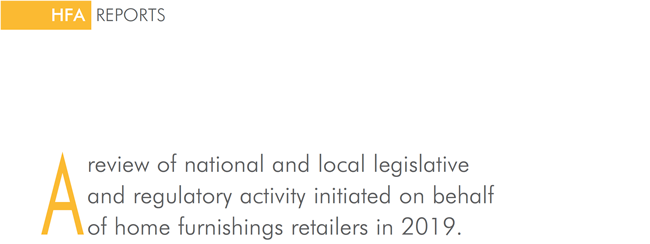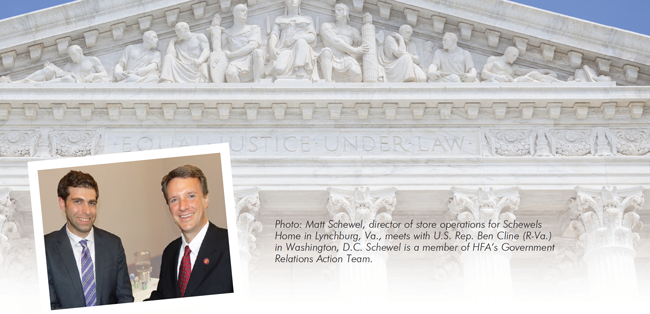
The work of tracking legislative and regulatory activity in the nation’s capital and all 50 states is shared by HFA’s Government Relations Action Team, the Washington, D.C., lobbying firm Dutko GR and an Association staff member. Together, they recommend policy positions to the HFA Board of Directors and project the association’s voice to Congress, administrative agencies and state decision-makers. In addition, the HFA often joins coalitions with other industry groups to multiply its impact.
Some of the issues addressed during the year were:
Flame Retardants
With industry allies, HFA successfully pressed Massachusetts Governor Charlie Baker in January to reject a bill that would have banned the use of flame-retardant chemicals in home furnishings products.
HFA contends that a national approach is better than enacting inconsistent laws in various states. HFA instead supports SOFFA, the Safer Occupancy Furnishings Flammability Act, a bipartisan congressional initiative that would apply California’s TB 117-2013 across the country.
QIP Tax Correction
An error in the 2017 Tax Cuts and Jobs Act limited the ability of retail businesses to write off the costs of investments in Qualified Improvement Property, or QIP. HFA joined a broad business coalition to push for a correction. Bills introduced in the House and Senate have drawn strong bipartisan support, thanks to coalition lobbying, but have not yet passed either chamber.
Stability
The last few months have seen intense activity in Congress and at the Consumer Products Safety Commission, in addition to changes in the ASTM voluntary furniture stability standard. HFA has sent a consistent message to its members: Don’t sell clothing storage units unless they meet the latest ASTM standard. HFA also advises members to urge their customers to anchor those chests and dressers to a wall or baseboard to prevent tip-over accidents.
Website Accessibility
Plaintiffs’ attorneys
continue to file lawsuits, or demand payments, contending that business websites fail to accommodate consumers with impaired vision, thus violating the Americans with Disabilities Act. |
Plaintiffs’ attorneys continue to file lawsuits, or demand payments, contending that business websites fail to accommodate consumers with impaired vision, thus violating the Americans with Disabilities Act. Furniture retailers are not immune. HFA encourages its members to improve website accessibility, but it also recognizes there are no clear standards outlining how compliance can be achieved. On behalf of one Florida member, HFA has initiated meetings in the offices of Florida Senators Marco Rubio and Rick Scott to urge a congressional remedy. The staff of Sen. Rubio’s Small Business Committee followed up by holding a roundtable discussion of the issue in Orlando on November 15, inviting Jeff Smith, general manager of HFA member Walker Furniture in Gainesville, to participate.
Tariffs
HFA wrote to President Donald Trump in September supporting his goals for a comprehensive trade deal with China but asking him to delay an increase in tariffs on furniture imports from that country. He did grant a delay, but the bulk of the tariffs remain, adding costs that must be passed to consumers. HFA is part of the Americans for Free Trade coalition that is working to inform the public about the harmful impact that tariffs have had on the U.S. economy.

The coming year is likely to be even busier. All HFA members are invited to get involved and join the association’s Government Relations Action Team. Contact staff member Doug Clark at 916-757-1167 or dclark@myhfa.org.
A feature about Home Furnishings Association's retail members, legislation affecting the furniture industry and other retail news from HFA.